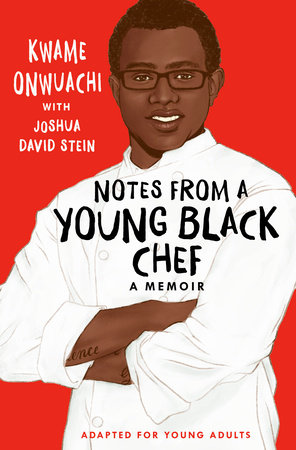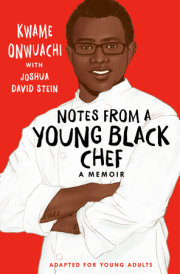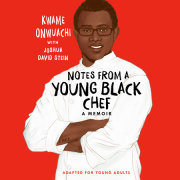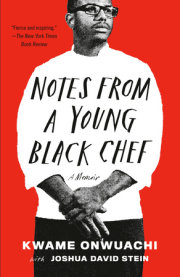Standing on Stories
The air is so warm in D.C. tonight, it still feels like summer. It’s October, it should be night already, but the sun is taking her sweet-ass time leaving the stage. It’s just too beautiful a day to say goodbye. From where I stand, on the fifth-floor balcony of the brand-new National Museum of African American History and Culture, the city spread below seems full of promise. Across the North Lawn, American flags flutter in the wind around the base of the Washington Monument. To the east, the Capitol building, with its impressive dome, is bathed in bright light, and to the south, the White House sits like a perfectly proportioned dollhouse. In the distance, the red and blue lights of the carousel at National Harbor glitter in a tiny festive constellation against the pink-fading-to-blue sky, guileless and beautiful.
Standing above the scene in my chef’s whites, I feel like an orchestra conductor peering in on my pit as the musicians tune up. Under the ruby sun, everything glimmers and shimmies with excitement. Next month is a historic election. Next month I’ll open my dream restaurant. Next month I’ll step into the life I’ve always wanted. So though it’s late in the day, it feels like the dawn of something new.
“Chef!” A voice behind me cuts short my daydream. “Where should we put the allium shoots?” The voice belongs to Jong Son, one of the team of nine young chefs I brought to cook at the museum with me tonight. “Next to the Ossetra caviar in the reach-in fridge,” I tell him. Behind me is a hive of activity as cooks rush to finish their premeal preparation, called
mise en place, before the guests begin to arrive. My mind turns to the spreadsheets and to the lengthy lists of tasks and quantities through which even the most sublime food—in fact, especially the most sublime food—must pass before it can be made whole again. I turn my back on the view and head in to the kitchen.
With the opening of my first restaurant, the Shaw Bijou, less than three weeks away, my mind churns on overdrive. For the past two years, the project has come to consume my life. It is, by far, the most ambitious thing I’ve ever been a part of, the most logistically complicated and the most precarious for me personally. It is the expression of years of busting my ass, of constant forward movement, of seizing opportunities manufactured to be beyond my grasp. Though my culinary journey started like so many other chefs’, as a child in my mother’s kitchen, opening a fine-dining restaurant of my own is the goal toward which all my efforts have been oriented. I’ll need every bit of luck, every scrap of knowledge, every shred of strength. I’ll need to call on every single connection I have, and tug on the thread of every story I can tell, to open the doors to my very own place.
The experience and knowledge I’ve gained since graduating from the Culinary Institute of America I hope will help me. My time at some of the best restaurants in the country I hope will prepare me. That I won a national dining competition called Dinner Lab and that I appeared on
Top Chef has hopefully given me a national audience that will translate into customers. But you never know. Everyone is famous to themselves. Whether the audience on the other side of the television screen will show up at the Shaw Bijou, I’m not sure.
When I arrived in Washington, D.C., from New York two years ago, I thought by now I’d be the prince of the D.C. restaurant world. Things haven’t gone exactly as planned. All ambitious restaurants suffer setbacks, but it seems we were dealt a particularly crummy hand. Already, my partners and I have blown through a handful of opening dates and hundreds of thousands of dollars. Everything that could go wrong has, from broken water mains to boneheaded zoning laws. I’ve found out that, just as L.A. is a city that’s run on movies, D.C. is a city that runs on red tape. But, somehow, we’ve toiled on and finally we have a date—November 1.
D.C. is a city whose culinary landscape has long suffered from the preferences of deep-pocketed politicians for the unchallenging, dick-swinging food of steakhouses. There is, of course, a small vanguard of fine-dining chefs, but as a young black chef from New York, who has worked in some of the most acclaimed restaurants in the country, my arrival was greeted with a lot of excitement and anticipation.
As the weeks turned into months that turned into years, the food media’s fascination with the Shaw Bijou has only grown. Bijou, as we call it, has become like a destination resting somewhere between myth and reality. As each detail leaked out—Washington, after all, is a city with no shortage of leaks—interest grew. There would be only eight tables. True. There would be a members-only club on the second floor. True. We would sell tickets, not take reservations, and those tickets would be nonrefundable. True. That I had parlayed my fifteen minutes of fame on
Top Chef into a million-dollar restaurant. Not true. My partners and I were already deep into opening Bijou long before
Top Chef ever came along. But there’s a lot out there about me that’s untrue.
I took a ton of heat a few months ago, when I announced that dinner at the Shaw Bijou would cost $185 per person, not including tax, tip, or wine pairing. The price tag made us one of the most expensive restaurants in D.C., and it immediately made me a target for populist rage. Who was I, the city’s critic class howled, to charge so much? How dare I, new here and so brazen, compete with José Andrés, whose flagship, minibar, was our closest equal, pricewise? To whom had I paid my dues?
I could have responded that our food costs were high and our margins were low. I could have pointed out that $185 is pricey, but when you look at cities with more established fine-dining scenes, cities like New York, a city with five Michelin three-star restaurants, to D.C., where the guide hadn’t even arrived yet, $185 is not ridiculous. I could have shown the haters the $150,000 worth of reservations we had presold and said, “Well, the public begs to differ.” The truth is, I could have said whatever I wanted to but nothing would have helped. It was an audacious move; part of being audacious is dealing with the blowback.
But the real truth, the truth I keep under lock and key, is that I also sometimes wonder if all the haters are right. This fear I haven’t shared with Mya, my fiancée, or my mother, Jewel, or even fully with myself. I haven’t dared to give shape to these thoughts with words. But damn, $185
is kinda pricey for a first-time chef in a new city. Who
do I think I am?
It’s a question I can’t afford to pose so close to opening night. Lately, my life has taken on the rhythms of a boxer in the lead-up to a title fight. I’m in the restaurant, in motion, head down for twelve hours a day. This morning began with me on my knees, for instance, grouting the tiles in the kitchen. Later I crawled into the phone-booth-sized office in the basement to finish assembling recipe books for my cooks. My eyes ache from peering at microcress and obsessing over the angle of a rice chip on a piece of lamb sweetbread. But in the high-wire act that is fine dining, these things matter. Well-grouted tiles matter. Millimeters matter. This frenetic pace is only broken up when I sit down with curious journalists for interviews in which I attempt to appear relaxed, confident, and charming as I make the case about why people should root for us. Then there are the meetings with my partners, in which I try to calm their nerves even as mine fray. Lately these have turned heated but I chalk it up to preopening jitters. And sometimes, maybe once a week, I see Mya, who lives with me a block from the restaurant but whose face I’m more likely to see when scrolling through Instagram or Facebook than in real life.
There are so many moving parts—from staffing and training to menu development to purchasing ingredients—that I shouldn’t even be at the museum tonight, but it’s too meaningful an opportunity to pass up. One of the lines of attack that pisses me off most in the backlash against the Shaw Bijou is the objection that I haven’t paid my dues. To all the morally outraged critics who say I haven’t, I want to clap back, “What were the brutal days working for little or no pay at blue-chip kitchens like Per Se and Eleven Madison Park, if not paying my dues? What was hunching my shoulders down toward the cutting board to weather the abuse of a fire-breathing chef but an act of supplication to the fine-dining gods?” Maybe it’s that I’m too young, that I haven’t been “a member in good standing” for long enough to deserve this chance. True, at twenty-six I haven’t put in decades in kitchens around the world, spending the years when I have the most energy, drive, and horsepower in someone else’s kitchen. I haven’t waited to be summoned for my big moment by a tap on the shoulder from a mysterious, benevolent stranger. It doesn’t work that way where I’m from. You make your own opportunities where I’m from.
But more infuriating is the question about to whom I should have been paying dues. It seems like the only ones keeping track are the white guys with tall hats. And how did those guys get into the club? By paying dues to older white guys with even taller hats. As for the thousands of black and brown chefs—dubbed cooks, domestics, servants, boys, and mammies who were kept out of restaurant kitchens or overlooked within them—they were beyond consideration. Their work, like them, was invisible. Invisible men and invisible women cooking invisible food for invisible children. So I get that it must be confusing for those who criticize me as an ingrate upstart—how can I pay dues to people who don’t exist?
They exist to me, though, and tonight I’m standing on their stories. In an immediate, physical way, the National Museum of African American History and Culture, on the last undeveloped plot on Constitution Avenue, is both oppressively and upliftingly powerful. Inspired by the angular shape of a Yoruban column from Nigeria, the museum is a three-tiered structure that looks like a futuristic wedding cake. The frame is wrapped in an intricately cut metal shroud that mimics the ironworks found on the gates and balustrades of cities like Charleston and New Orleans. At one time, these ornamental ironworks were fashioned by slaves and installed on the buildings of their masters. But those chains are broken now, and the museum celebrates those who lived bound by them, those who broke them, and all we’ve done as a people since.
Why am I here tonight? A few months ago, the champagne maker Dom Pérignon asked me to create an “African American”–themed menu for a dinner to celebrate David Adjaye, the Ghanaian British architect who designed the building. At first I balked at the request. I don’t do “African American–themed” menus. I am an African American chef, so if I cook
my food, isn’t every menu I create African American by default?
On the other hand, why quibble? This is a media dinner, not a thesis on race. And anyway, I was gearing up to open a restaurant. Any press is good press, and good press is especially good press.
There’s a lot riding on my performance tonight. It’s not that a critic might walk through the door (I’ve checked the guest list for both real names and known pseudonyms). It’s not that I’m cooking for forty-seven of the most influential tastemakers in D.C., the people I need to evangelize for me in the name of the Shaw Bijou. It’s that I’m cooking for all the people, and to tell all the stories, told and untold, remembered and forgotten, housed in the floors below me.
Before we started prepping, I had a chance to wander the empty halls. Though the building is massive, rising hundreds of feet above the ground, the most harrowing exhibits are housed in three subterranean galleries bluntly called the History Galleries. Dug deep into the soil, the first level—the lowest, the earliest, the most base—is given over to the horrors and heartbreak of the American slave trade. Like any black man in America, I’ve felt the effects of enslavement through time. Though for me the shackles have been figurative, they’re nonetheless very real. In ways spoken and unspoken I bear the offspring of the wounds, welts, and scars whose victims are memorialized beneath me.
Like them, I live with the contradiction between what this country says it is and what it really is, as my mother and father have, as my brothers and sisters have, and as my ancestors have too.
But to come face-to-iron with actual shackles, rusty and real, that once bound the wrists of a kidnapped African child; to see a whip, its leather worn supple with cruelty; to see the splinters on the rough-hewn whitewashed walls of a slave cabin, reassembled here from its home on a Charleston plantation; to see a stack of bricks as high as a man, each representing a slave owned by Thomas Jefferson, is to mainline history straight into my bloodstream. Exhilarating. Edifying. Important. Infuriating.
The misery of the Middle Passage, the transformation of people into property, the anger I still feel when confronted by so much freedom stolen, all are intensified by the contrast between the sadistic insanity visited upon my ancestors and the richness of the lives in Africa from which they were ripped. I have seen both sides. I have been T’Challa and I have been Killmonger. I have grown up in the knockabout projects. In the Bronx, I’ve been the kid on the corner, but I have also spent time in Nigeria with my grandfather, an Igbo
obi, where there were no projects, no blocks, no corners.
Copyright © 2019 by Kwame Onwuachi. All rights reserved. No part of this excerpt may be reproduced or reprinted without permission in writing from the publisher.











